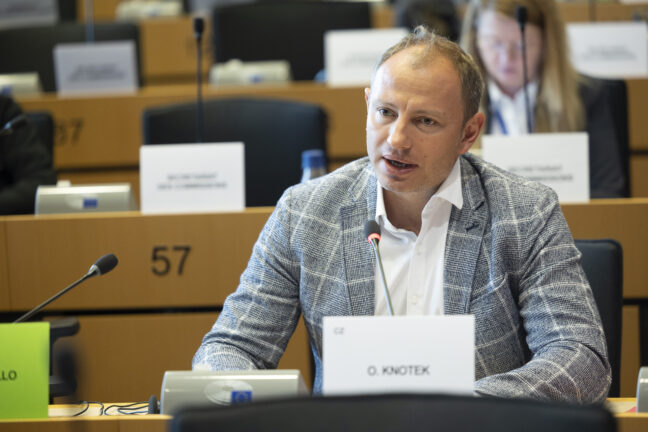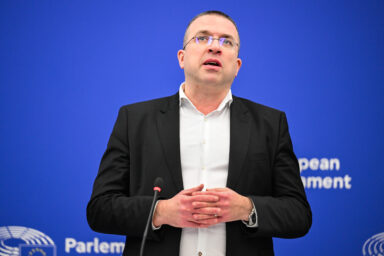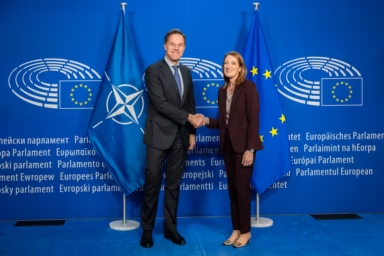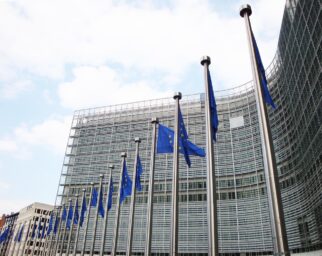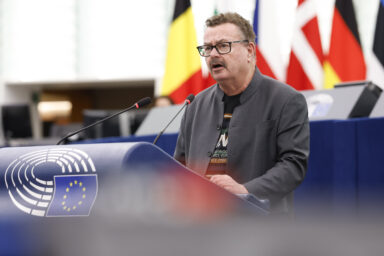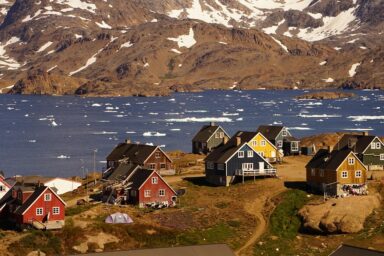The EU’s new 2040 climate target has hit early resistance in Parliament. A draft report by a key Patriots lawmaker rejects the European Commission’s proposed 90% emissions cut.
The European Commission’s proposed new climate target – a 90 per cent reduction in greenhouse gas emissions by 2040 compared to 1990 levels – took a hit from the right on Thursday. MEP Ondřej Knotek (PfE/CZ), who was (in a surprising turn of events) recently appointed as the European Parliament’s rapporteur for the file, submitted a draft report that rejects the proposal.
In an accompanying press release, Mr Knotek cites concerns about the impact such a target could have on European industry and households. He also criticises the need for a new goal, noting that the EU already has two another legally binding targets: the 2030 emissions goal (under the Fit for 55 package) and the 2050 climate neutrality objective.
Opposition to the 2040 target
As the lead MEP on the 2040 file, Mr Knotek is responsible for setting the agenda for parliamentary negotiations to define a common position. However, his membership in the far-right Patriots for Europe group – which has called for a suspension and fundamental overhaul of the EU Green Deal in the past – raised major concerns among climate-focused lawmakers. The group has consistently opposed key Green Deal legislation and recently helped block an attempt to fast-track 2040 target discussions through Parliament, ensuring it retained leverage over both timing and content.
As rapporteur, Mr Knotek cannot delay the process indefinitely and will have to face the reality that his faction might lack support in Parliament to stall or completely sink the legislation. But in a brief interview with EU Perspectives, he shrugged off those concerns, stating he would challenge the EC on its climate push – which he claims puts competitiveness in the bloc at risk – anyways.
You might be interested
“If we just look globally, only a few countries have made [similar legal commitments] and have done as much as quickly as the European Union. There are countries like China and India who also talk about one day becoming climate neutral. Their legislation allows them to do some sustainable or environmentally-friendly steps. But they do not have legally-binding laws. We are already the flagship. At this stage to introduce a new 2040 target, as the only ones in the world? Who will follow?”
To be clear, the UK, Canada, New Zealand, Japan, South Korea, Chile, and South Africa all have legally binding climate targets, including net-zero emissions commitments. Setting legally-binding climate goals are not as unique as the MEP suggests.

The EC and more centrist MEPs would disagree
In Mr Knotek’s view, further cementing a new climate target will hurt the bloc at a time when the EU has to do its utmost to improve industry resilience and competitiveness. He suggests that focusing “only on climate” would be detrimental.
“If we want to maintain some industries in Europe, we cannot simply decarbonise them at this speed (…) Europe has other challenges, and putting all the eggs into one basket, just to say we are the most ambitious, does not make sense.”
In the press release he issued on Thursday the MEP fully outlined his group’s position: “the PfE rejects unilateral and hasty steps that would harm European citizens and industry”. In the text, he adds, perhaps surprisingly, “We understand and support the need to respond correctly to climate change. But we say clearly: Europe must not go down the path of unilateral, accelerated measures that threaten economic stability and people’s living standards.”
But the European Comission would disagree, maintaining that meeting the 2040 target will not have a negative impact. On the contrary, in its 2 July 2025 release it states:
“The Commission proposal emphasises the importance of accelerating and strengthening the right enabling conditions to support this 90% target. These include a competitive European industry, a fair transition that leaves no one behind, and a level playing field with our international partners. In addition, the proposal sets a clear frame for our post-2030 climate and energy legislation. National specificities will be taken into account. Cost-effectiveness, simplicity and efficiency will be guiding principles, together with ensuring technological neutrality and a transition that is fair and just for everybody.”
Indeed, reports such as the one released by Mario Draghi last year underline the fact that the European Union must decarbonize in order to stay competitive.
Moving ahead
Although the far right gained influence in the latest European elections, members lack broader cross-party support. “Negotiation is practically the job description,” says Mr Knotek when asked how he plans to persuade colleagues across the aisle. He suggests that in some cases he might just appeal to everyday ‘common sense’. Whether that will find many ‘buyers’ is uncertain. After all, a rapporteur being dead set against the brief he is supposed to represent is not a subtle absurdity. For many that single fact makes very little sense.
Not that it is causing the MEP much grief: at a moment that he is able to control the entirety of the process, Mr Knotek is certain, whatever happens, his own political group will hang tough.
“We did not create Patriots to accept compromises that are less bad or just because some progressive groups would like to see them in place. There are limits [to what we can accept]. We need to help business to survive, to go through the transition. At the end of the day, I want to be sure there aren’t unanswered questions left on the map,” the MEP claims.
